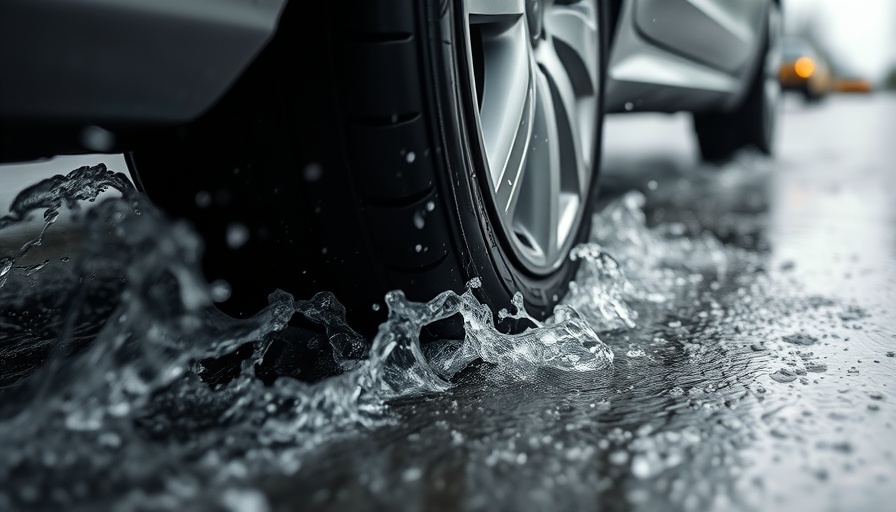
Understanding Hydroplaning: What You Need to Know
Hydroplaning, an alarming experience for many drivers, happens when your vehicle's tires lose traction on a layer of water or slick surfaces. Similar to driving on ice, it can lead to dangerous situations where steering, braking, and acceleration are impaired. The critical factor here is the 'contact patch'—the small area of your tire that grips the road, roughly equivalent to the size of your palm. When water accumulates, it diminishes this contact patch's effectiveness, leaving drivers vulnerable.
The Physics of Hydroplaning: How It Occurs
According to Robert Dillman, a defensive driving expert, hydroplaning transpires when a tire collects more water than it can handle. This causes the tread to oversaturate, generating a "water-on-water" layer under the tire and disallowing effective road contact. This phenomenon isn’t limited solely to water; tires can also lose grip on mud or snow when these materials fill the treads faster than they can be expelled. The moment your tires begin to float on this layer of liquid, you lose that crucial grip on reality—both literally and figuratively.
The Dangers of Hydroplaning
Hydroplaning can turn a routine drive into a perilous gamble. When tires glide atop water instead of firmly planted on the road, the risk of accidents increases exponentially. The unpredictability of steering and braking often leads to severe crashes, especially if drivers panic, leading to overcorrection and sudden movements that exacerbate the situation.
Common Causes of Hydroplaning
There are several factors that contribute to hydroplaning. Understanding these can empower drivers to take proactive measures:
- Water Accumulation: The primary cause of hydroplaning is having more water on the road than your tires can displace. With a mid-south climate that often brings heavy rains, staying aware of waterlogged roads is crucial.
- Oil Slicks: After a dry spell, oil and other vehicle fluids accumulate on roads. The initial rain can cause these substances to float, creating a slippery surface. This highlights why it’s vital to exercise caution when driving in the first rain after a dry spell.
- Poor Tire Condition: Worn tires with insufficient tread depth can’t effectively channel water away from their contact patch. Regularly checking tire health should be part of every driver’s routine.
- Tire Pressure: Underinflated or overinflated tires reduce the contact area with the road, making them less able to grip and channel water. It's advised to monitor tire pressure regularly, especially before long drives.
- Road Conditions: Smooth roads with poor drainage can retain water longer; thus, cities in the MidSouth should invest in better road maintenance and drainage systems to mitigate these risks.
How to Prevent Hydroplaning: Tips for Safe Driving
The silver lining is that hydroplaning can be avoided with careful driving strategies.
- Adjust Your Speed: Slow down during rain, particularly in the first few minutes when oil floats on the water.
- Avoid Sudden Movements: Quick turns, swerving to avoid puddles, and sudden braking can instigate hydroplaning. Instead, maintain a steady hand on the wheel and a smooth driving style.
- Keep Tires in Top Shape: Regularly check tread depth and tire pressure to ensure your vehicle can combat slick conditions. Investing in quality tires is a wise choice for any driver.
- Be Mindful of Visibility: Poor visibility during rain means you should allow extra stopping distance and be more aware of other vehicles and pedestrians.
Taking Control: What to Do If You Hydroplane
If you find yourself hydroplaning, panic can lead to further loss of control. Instead, experts recommend the following actions:
- Keep a steady grip on the steering wheel and do not overcorrect.
- Take your foot off the accelerator; braking abruptly can worsen hydroplaning.
- Wait until the tires regain traction before steering again. This may feel counterintuitive but is crucial for regaining control.
Knowledge is power—understanding what hydroplaning is and how to combat it is vital for everyone, especially residents of the MidSouth, where rain and slick roads are common. Familiarizing yourself with these preventive measures can ultimately save lives and maintain safer road conditions for everyone.
Call to Action: Stay Safe on Wet Roads
As a concerned driver in the MidSouth, take a moment to implement these strategies the next time you head out on wet roads. Your safety, and the safety of those around you, depends on preparedness. Don’t hesitate to pass on this knowledge to friends and family—everyone deserves a safer driving experience!
 Add Row
Add Row  Add
Add 



 Add Row
Add Row  Add
Add 
Write A Comment